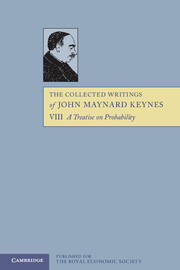Book contents
- Frontmatter
- Contents
- General Introduction
- Editorial Foreword by R. B. Braithwaite
- Editorial Note
- Preface to the First Edition
- I FUNDAMENTAL IDEAS
- II FUNDAMENTAL THEOREMS
- III INDUCTION AND ANALOGY
- 18 INTRODUCTION
- 19 THE NATURE OF ARGUMENT BY ANALOGY
- 20 THE VALUE OF MULTIPLICATION OF INSTANCES, OR PURE INDUCTION
- 21 THE NATURE OF INDUCTIVE ARGUMENT CONTINUED
- 22 THE JUSTIFICATION OF THESE METHODS
- 23 SOME HISTORICAL NOTES ON INDUCTION NOTES ON PART III
- IV SOME PHILOSOPHICAL APPLICATIONS OF PROBABILITY
- V THE FOUNDATIONS OF STATISTICAL INFERENCE
- Bibliography
- Index
18 - INTRODUCTION
from III - INDUCTION AND ANALOGY
Published online by Cambridge University Press: 05 November 2012
- Frontmatter
- Contents
- General Introduction
- Editorial Foreword by R. B. Braithwaite
- Editorial Note
- Preface to the First Edition
- I FUNDAMENTAL IDEAS
- II FUNDAMENTAL THEOREMS
- III INDUCTION AND ANALOGY
- 18 INTRODUCTION
- 19 THE NATURE OF ARGUMENT BY ANALOGY
- 20 THE VALUE OF MULTIPLICATION OF INSTANCES, OR PURE INDUCTION
- 21 THE NATURE OF INDUCTIVE ARGUMENT CONTINUED
- 22 THE JUSTIFICATION OF THESE METHODS
- 23 SOME HISTORICAL NOTES ON INDUCTION NOTES ON PART III
- IV SOME PHILOSOPHICAL APPLICATIONS OF PROBABILITY
- V THE FOUNDATIONS OF STATISTICAL INFERENCE
- Bibliography
- Index
Summary
Nothing so like as eggs; yet no one, on account of this apparent similarity, expects the same taste and relish in all of them. ’Tis only after a long course of uniform experiments in any kind, that we attain a firm reliance and security with regard to a particular event. Now where is that process of reasoning, which from one instance draws a conclusion, so different from that which it infers from a hundred instances, that are no way different from that single instance? This question I propose as much for the sake of information, as with any intention of raising difficulties. I cannot find, I cannot imagine any such reasoning. But I keep my mind still open to instruction, if any one will vouchsafe to bestow it on me.
Hume.1. I have described probability as comprising that part of logic which deals with arguments which are rational but not conclusive. By far the most important types of such arguments are those which are based on the methods of induction and analogy. Almost all empirical science rests on these. And the decisions dictated by experience in the ordinary conduct of life generally depend on them. To the analysis and logical justification of these methods the following chapters are directed.
Inductive processes have formed, of course, at all times a vital, habitual part of the mind's machinery. Whenever we learn by experience, we are using them. But in the logic of the schools they have taken their proper place slowly. No clear or satisfactory account of them is to be found anywhere. Within and yet beyond the scope of formal logic, on the line, apparently, between mental and natural philosophy, induction has been admitted into the organon of scientific proof, without much help from the logicians, no one quite knows when.
- Type
- Chapter
- Information
- The Collected Writings of John Maynard Keynes , pp. 241 - 246Publisher: Royal Economic SocietyPrint publication year: 1978

